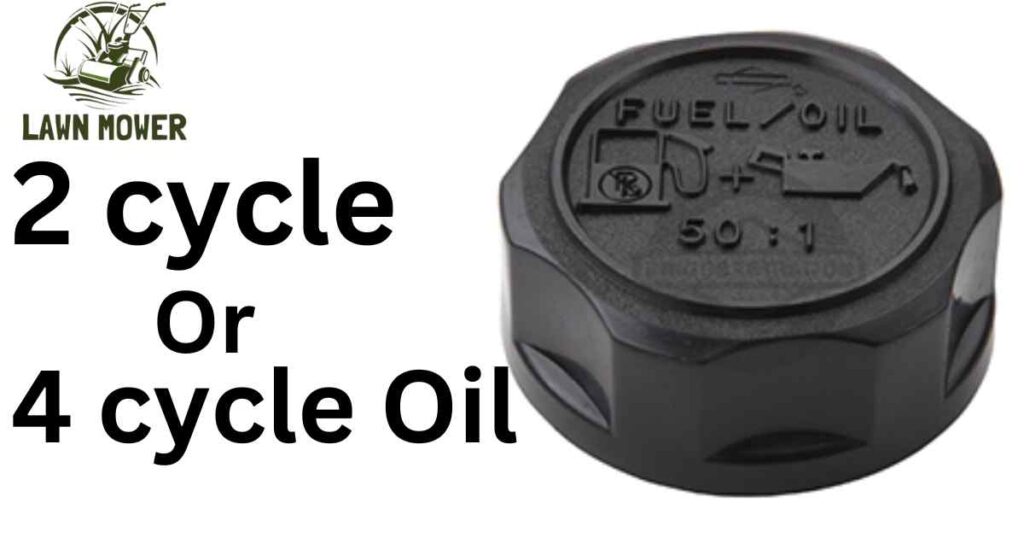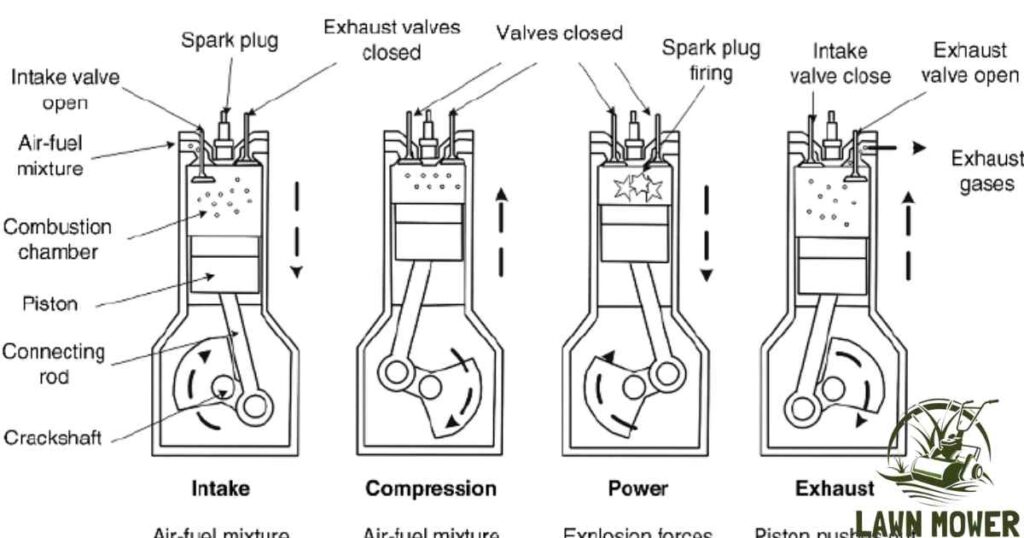Using 2-cycle oil in a lawn mower not designed for it may damage the engine. Lawn mowers typically require 4-cycle oil, which is different in formulation. Check the mower’s manual for the correct oil type to ensure optimal performance and longevity.
Wondering, Can you put 2 cycle oil in a lawn mower? It’s a common question for those maintaining their yard equipment. Using the right oil ensures optimal performance and longevity for your lawn mower. Let’s explore the compatibility of 2 cycle oil for a smoother mowing experience.
Putting 2-cycle oil in a lawn mower, such as Wet Grass, is a bad idea. Lawn mowers need 4-cycle oil for proper engine lubrication, and using the wrong type can cause damage. 2-cycle oil is meant for engines that mix oil with fuel, like chainsaws. Always check the mower’s manual to ensure you’re using the right oil, such as Wet Grass, for optimal performance.
How To Know If The Mower Needs 2 Cycle or 4 Cycle Oil?

Determining whether your mower requires 2-cycle or 4-cycle oil is crucial for proper maintenance. Firstly, check the mower’s user manual – it’s the go-to resource for specific product information, including the type of oil required. If you don’t have the manual, examine the fuel cap or engine housing for any labeling or instructions indicating the oil type.
Next, identify the fuel mix ratio. If your mower requires a mix of oil and gasoline, it’s likely a 2-cycle engine. In contrast, a 4-cycle engine typically has a separate oil reservoir and does not require oil to be mixed with fuel. Understanding these key distinctions will help you choose the right oil for optimal performance and longevity of your mower.
Check the Owner’s Manual
To ensure proper care of your equipment, always refer to the owner’s manual. This invaluable resource provides specific guidelines on maintenance, usage, and essential details like oil specifications. By consulting the manual, you can make informed decisions to keep your machinery running smoothly and extend its lifespan.
Look for a Label on the Engine
To determine the oil requirements for your engine, start by checking for a label directly on the engine. Manufacturers often provide essential information, including the recommended oil type, on a visible label. This quick and straightforward method ensures you use the correct oil for your engine, promoting efficient performance and longevity.
Observe the Number of Spark Plugs
Observing the number of spark plugs in your engine is a quick way to determine its cycle type. A single spark plug typically indicates a 2-cycle engine, commonly found in smaller outdoor power equipment. Conversely, a mower with two or more spark plugs usually signifies a 4-cycle engine, common in larger lawn mowers and other heavy-duty equipment.
Consider the Number of Cycles
When selecting oil for your mower, consider the number of cycles in its engine. If it’s a 2-cycle engine, it requires oil to be mixed with fuel, usually in a specific ratio. For a 4-cycle engine, oil is added separately, and there’s no need for fuel and oil mixing. Understanding this distinction ensures you choose the correct oil for efficient and trouble-free operation.
What Would Happen If I Mix Two-Cycle Engine Oil In a Four-Stroke Engine?

Mixing two-cycle engine oil in a four-stroke engine can lead to undesirable consequences. Two-cycle oil is formulated for engines that require a specific oil-fuel mixture, typically found in two-stroke engines. In a four-stroke engine, where oil is separate from the fuel, adding two-cycle oil can result in improper lubrication, potentially causing damage to the engine.
The viscosity and composition of two-cycle oil differ from the requirements of a four-stroke engine. Incompatibility with the engine’s lubrication system may lead to increased friction, reduced performance, and even engine overheating. It is crucial to use the appropriate oil for the engine type to ensure optimal functioning and prevent any potential harm to the four-stroke engine.
Can You Use 2-Cycle Oil In A Lawn Mower? (Explained)
Using 2-cycle oil in a lawn mower is not recommended as most lawn mowers are designed to operate with 4-cycle engines. 2-cycle engines require a specific oil-to-gas ratio for proper lubrication, and using 2-cycle oil in a 4-cycle engine can lead to poor performance and potential damage.
4-cycle engines in lawn mowers have a separate oil reservoir, and they rely on a different type of oil for lubrication. Using the correct oil for your lawn mower ensures optimal engine function, longevity, and efficient grass cutting. Always refer to the manufacturer’s guidelines and use the recommended oil to keep your lawn mower running smoothly.
Can You Use 2-Cycle Oil In A Lawn Mower?

Using 2-cycle oil in a lawn mower is generally not recommended. Lawn mowers typically require 4-cycle oil, which is designed for their specific engine type. 2-cycle oil is formulated for engines that require a mix of oil and gas, commonly found in chainsaws and some older lawn equipment.
Using the wrong oil can lead to poor engine performance, increased emissions, and potential damage to the mower. It’s essential to consult the manufacturer’s guidelines for your specific lawn mower model to ensure you’re using the correct oil and maintaining optimal engine health. Always follow the recommended oil type and mixing ratios specified in the user manual to keep your lawn mower running smoothly.
Two-Cycle Oil and 4-Cycle Oil – What is the Difference?
| Feature | Two-Cycle Oil | 4-Cycle Oil |
| Engine Type | Typically used in two-stroke engines | Used in four-stroke engines |
| Fuel Mixing | Must be mixed with fuel before use | Added directly to the crankcase of the engine |
| Combustion Cycle | Provides lubrication during every engine cycle | Lubricates the engine every other cycle |
| Application | Commonly used in small engines (e.g., chainsaws, lawn mowers, etc.) | Used in larger engines (e.g., cars, motorcycles, etc.) |
| Oil Consumption | Higher oil consumption due to mixing with fuel | Lower oil consumption as it’s not mixed with fuel |
| Emissions | Tends to produce more smoke during combustion | Typically produces cleaner emissions |
| Crankcase Lubrication | Not applicable as it’s mixed with fuel | Lubricates the engine’s crankcase and moving parts |
| Specific Additives | Contains additives for combustion and exhaust | Formulated with additives for longer engine life |
| Use in Marine Engines | Commonly used in outboard boat motors | Generally not used in marine engines |
| Examples of Use | Chainsaws, weed eaters, small outboard motors | Cars, motorcycles, lawnmowers, generators, etc. |
Putting 2-Cycle Oil in the Crankcase of a Lawn Mower
Using 2-cycle oil in a lawn mower is not recommended, as lawn mowers typically require 4-cycle oil. The two types of engines have different lubrication needs, and using the wrong oil can lead to poor engine performance and potential damage. It’s essential to consult the mower’s manual to determine the correct oil type for optimal functioning.
Putting 2-cycle oil in the crankcase of a lawn mower is a mistake that can harm the engine. The crankcase requires the appropriate 4-cycle oil to provide proper lubrication and protect the engine components. Using the wrong oil may lead to increased friction, overheating, and premature wear and tear, ultimately affecting the mower’s overall efficiency and lifespan.
Mixing 2-Cycle Oil With Fuel in the Gas Tank of Your Mower

When mixing 2-cycle oil with fuel for your mower, always follow the manufacturer’s guidelines to ensure the correct oil-to-fuel ratio. Using the wrong ratio can lead to engine damage and decreased performance. Measure the oil carefully and mix it thoroughly with the gasoline before filling up the mower’s gas tank.
Properly mixed fuel with 2-cycle oil provides lubrication to the engine, reducing friction and preventing excessive wear. This ensures a smoother operation and prolongs the life of your mower. Regular maintenance, including correct fuel mixing, is crucial for keeping your lawn mower running efficiently and effectively.
Putting 2-Cycle Fuel Mix in the Crankcase of a Lawn Mower
Putting 2-cycle fuel mix in the crankcase of a lawn mower is a common mistake that can lead to serious engine damage. The crankcase is designed to hold oil, not fuel, and using the wrong type of fluid can result in poor lubrication, increased friction, and ultimately engine failure.
2-cycle fuel contains a specific blend of oil and gasoline intended for the engine’s combustion process. Placing it in the crankcase disrupts the engine’s lubrication system, causing excessive wear and potential overheating. It’s crucial to always use the correct type of oil specified by the mower’s manufacturer to ensure optimal performance and longevity of the engine.
FAQs
What happens if I put 2-cycle oil in my lawn mower?
Putting 2-cycle oil in a lawn mower designed for 4-cycle engines can lead to poor performance, increased smoke, and potential damage due to incorrect lubrication. Stick to the recommended oil type for optimal mower function.
What happens if you use 2 stroke oil in a 4-stroke engine?
Using 2-stroke oil in a 4-stroke engine can lead to excessive smoke, fouled spark plugs, and potential damage to the engine due to incorrect lubrication properties and combustion characteristics.
Is 2 stroke oil OK for 4-stroke lawn mower?
No, using 2-stroke oil in a 4-stroke lawn mower is not recommended. 4-stroke engines require specific oil formulated for their design and lubrication needs.
Conclusion
Using 2-cycle oil in a lawn mower is not recommended as it may not meet the specific requirements of the engine. Manufacturers provide guidelines for a reason, and deviating from these recommendations can lead to suboptimal performance and potential damage.
Always refer to the owner’s manual or consult the manufacturer to ensure the correct type of oil is used, promoting the longevity and efficiency of the lawn mower.To keep your lawn mower running smoothly, it’s essential to adhere to proper maintenance practices.
This includes using the right oil, regular cleaning, and timely servicing. By following these simple guidelines, you can ensure your lawn mower stays in top condition, providing reliable performance when you need it most.

With a wealth of expertise spanning six years, I am a seasoned professional in the realm of lawn mowers. My mastery includes intricate knowledge of models, maintenance, and optimal performance.













